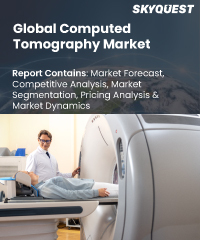
Product ID: SQMIG35A2438

Report ID:
SQMIG35A2438 |
Region:
Global |
Published Date: March, 2024
Pages:
219
|
Tables:
65 |
Figures:
75
Global Computed Tomography Market size was valued at USD 4.29 billion in 2022 and is poised to grow from USD 4.60 billion in 2023 to USD 8.09 billion by 2031, at a CAGR of 7.3% during the forecast period (2024- 2031).
The market's growth is fueled by an increasing prevalence of chronic diseases, an aging population, and the demand for early and accurate diagnoses. Advancements in technology, including the development of high-resolution and low-dose CT systems, further contribute to market expansion by improving image quality and reducing radiation exposure.
Moreover, the incorporation of AI and machine learning algorithms for image analysis adds a layer of sophistication to diagnostics. However, challenges such as high installation and maintenance costs, along with concerns about radiation exposure, need to be addressed. As the healthcare industry embraces technological progress and strives for improved patient outcomes, the Global CT Market remains at the forefront of medical innovation, reshaping diagnostic approaches and treatment strategies.
US Computed Tomography Market is poised to grow at a sustainable CAGR for the next forecast year.
Our industry expert will work with you to provide you with customized data in a short amount of time.
REQUEST FREE CUSTOMIZATIONWant to customize this report? This report can be personalized according to your needs. Our analysts and industry experts will work directly with you to understand your requirements and provide you with customized data in a short amount of time. We offer $1000 worth of FREE customization at the time of purchase.

Product ID: SQMIG35A2438